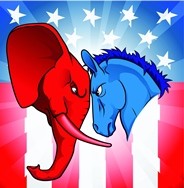
This column by Indiana Chamber Director of Publications and Social Media Matt Ottinger originally appeared in the Inside INdiana Business newsletter, Inside Edge.
At a recent event I attended, the conversation among my tablemates turned to politics – namely the late September Republican presidential debate on CNN. Most of my fellow attendees casually mentioned their disdain for the spectacle. When it was my turn to comment, I simply stated, “I love it. I’m not proud of that, but I do.”
Whether it’s Donald Trump’s bombast and “Mean Girls”-style insults, Chris Christie’s bluster and scolding or Rand Paul’s visible contempt for having to be part of the charade, I can’t get enough. For me, it’s like I’m swimming in a barrel of Tropical Skittles next to a keg of Mr. Pibb during a binge watching session of “House of Cards” – an overdose of disgusting, shameful goodness, and I’m simply helpless to its siren song.
It’s been intriguing watching our Midwestern neighbor and former Congressional budget hawk John Kasich strike the moderate chord, while projected frontrunner Jeb Bush struggles to meet lofty expectations. And then there’s Scott Walker. Poor, poor Scott Walker, who disappeared from the race faster than a cheese curd at a mouse convention in Milwaukee.
Granted, politics can devolve into a game at times, but it mustn’t be forgotten that the political world greatly impacts the business community. That’s why our political action committee, Indiana Business for Responsive Government, always has boots on the ground impacting statewide races. It’s also why the Indiana Chamber takes an increasing number of business leaders to Washington, D.C. annually during our D.C. Fly-in. We’re grateful to Indiana’s Congressional delegation for meeting with our members and guests to discuss the issues critical to their businesses and economic growth in our state.
Furthermore, due to my personal affinity for the craft, it was quite a pleasure speaking with famed politicos James Carville and Karl Rove for our most recent edition of BizVoice magazine. The Q&A serves as a preview to the duo’s upcoming appearance as keynote speakers at the Indiana Chamber’s 26th Annual Awards Dinner on Nov. 4.
During the conversations (which took place in mid-July), I asked their perspectives about the opposition’s outlook on the 2016 presidential race:
Rove on if Sen. Bernie Sanders actually has a chance to win the Democratic Party’s nomination: “There’s substance, but the problem is that while you have a very liberal turnout in the Iowa caucuses, and New Hampshire is a more liberal state, there aren’t a lot of Burlingtons and Benningtons and Berkeleys and San Franciscos. There are a lot more Indianapolises and Evansvilles. While he runs well with the hard left, if you’re not very liberal, he’s not your cup of tea. (Clinton) will be the nominee, but it won’t be as easy as people think.”
Carville on if the attention to Trump’s bellicosity is a danger to the Republican brand (at the time of the interview, Trump had recently made statements about Mexicans crossing the border and raping women): “Yes I do. The reason is there are a considerable number of Republicans who agree with him. It’s exposing there are people out there who believe that. That’s a part of that party that is not going to go away with time. When he goes away, somebody will pick it up again.”
Trump, however, still leads national polling, so he continues to resonate with a portion of the country, although prognosticators are predicting his impending demise.
If pressed to make a prediction this early (and it’s so early I’ll likely regret it), I’d forecast a Marco Rubio vs. Hillary Clinton showdown next fall.
In early November, Carville and Rove will offer their expert opinions on the presidential race and politics. A few tickets still remain for the event and can be purchased online.
It will be a great evening of banter, insights and celebration of the business community; we hope to see you there!

 It’s way too early for this, but I can’t help myself. Hillary Clinton and Chris Christie appear to be favorites as nominees for the 2016 election, and
It’s way too early for this, but I can’t help myself. Hillary Clinton and Chris Christie appear to be favorites as nominees for the 2016 election, and  The Indianapolis Convention Center ballroom was filled to capacity yesterday afternoon as famed political satirist P.J. O’Rourke took the Economic Club of Indiana stage.
The Indianapolis Convention Center ballroom was filled to capacity yesterday afternoon as famed political satirist P.J. O’Rourke took the Economic Club of Indiana stage.